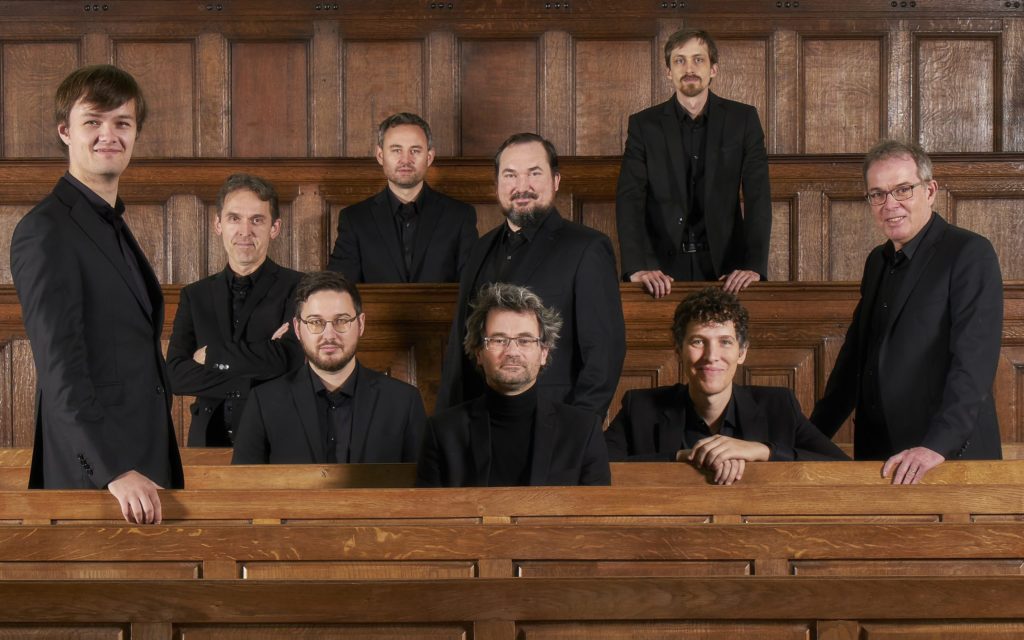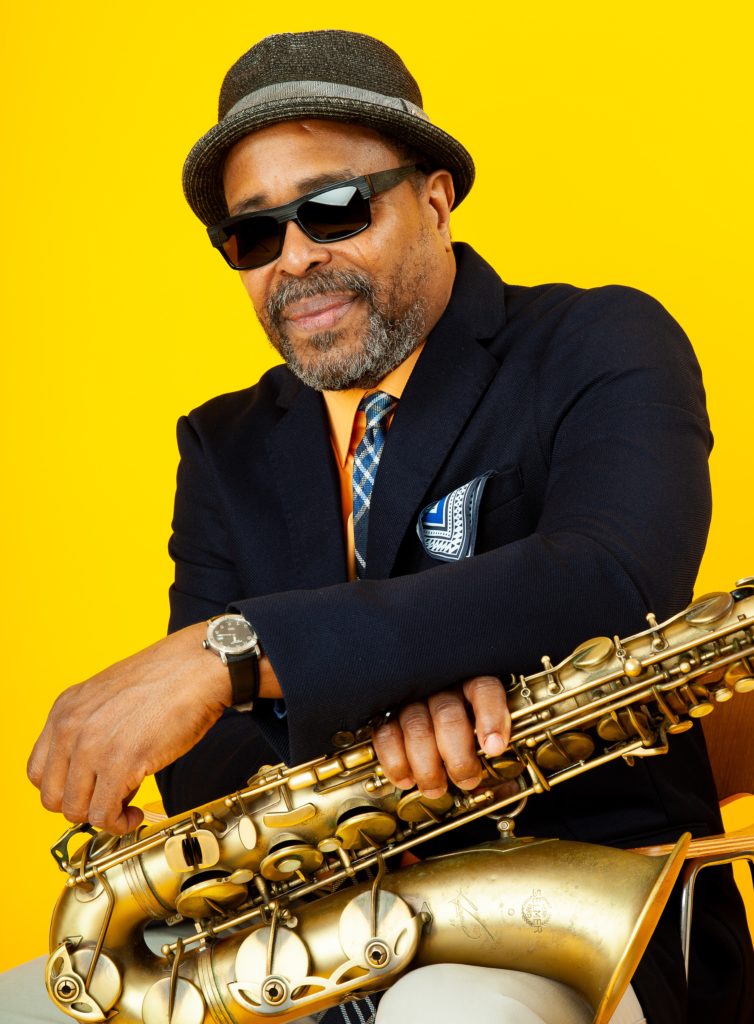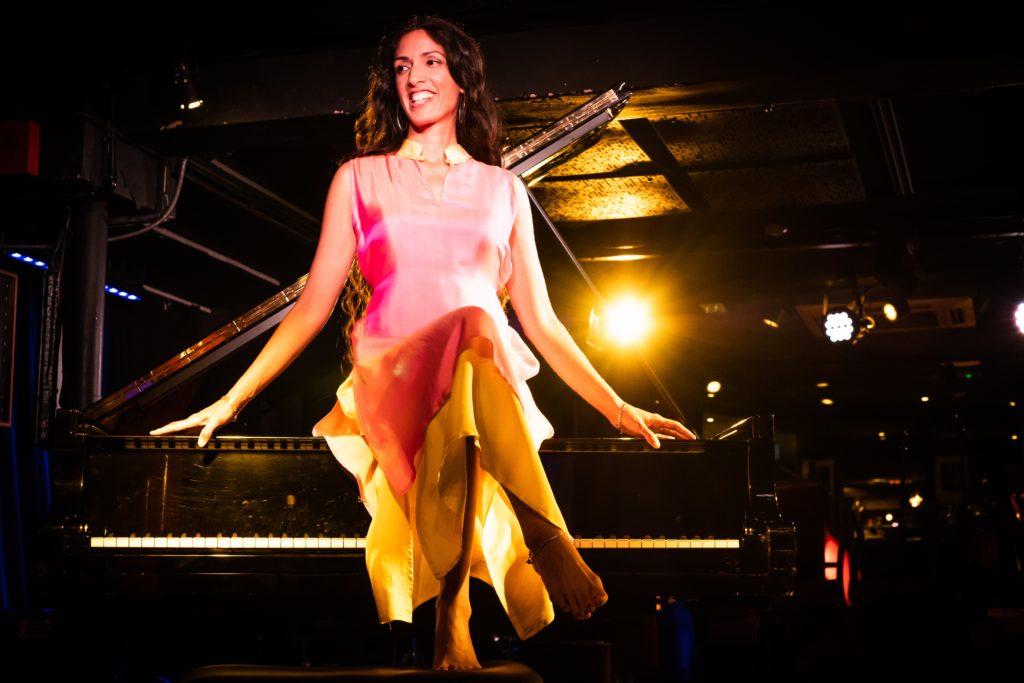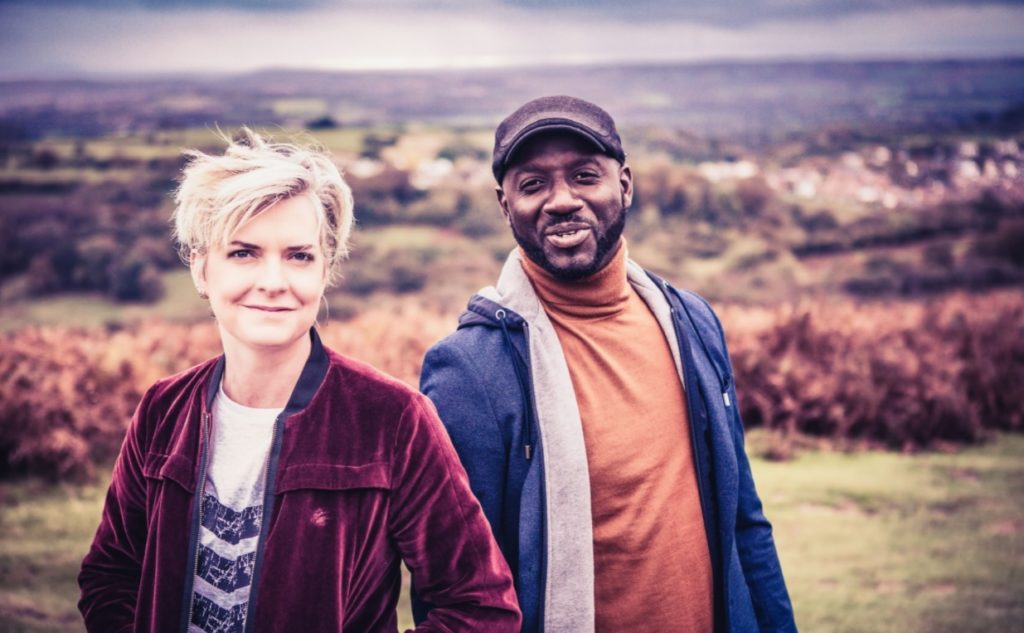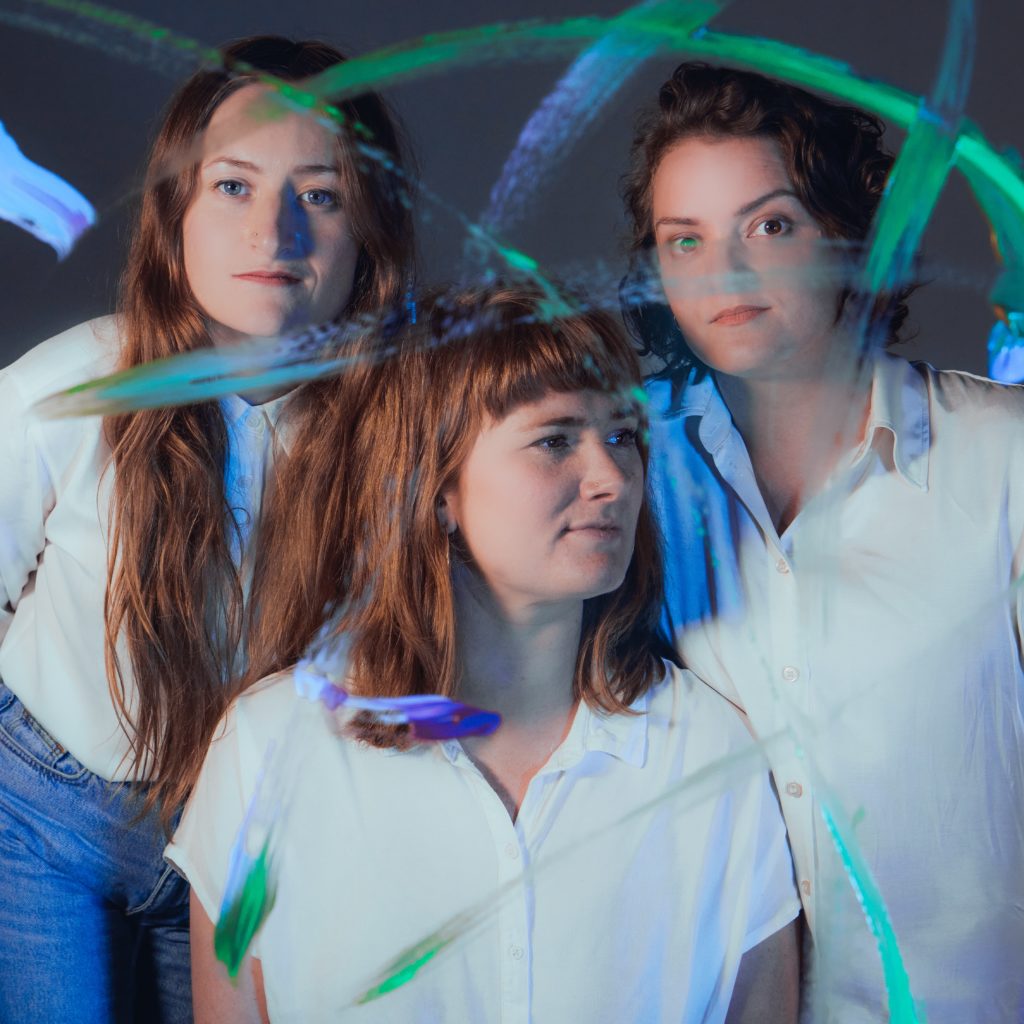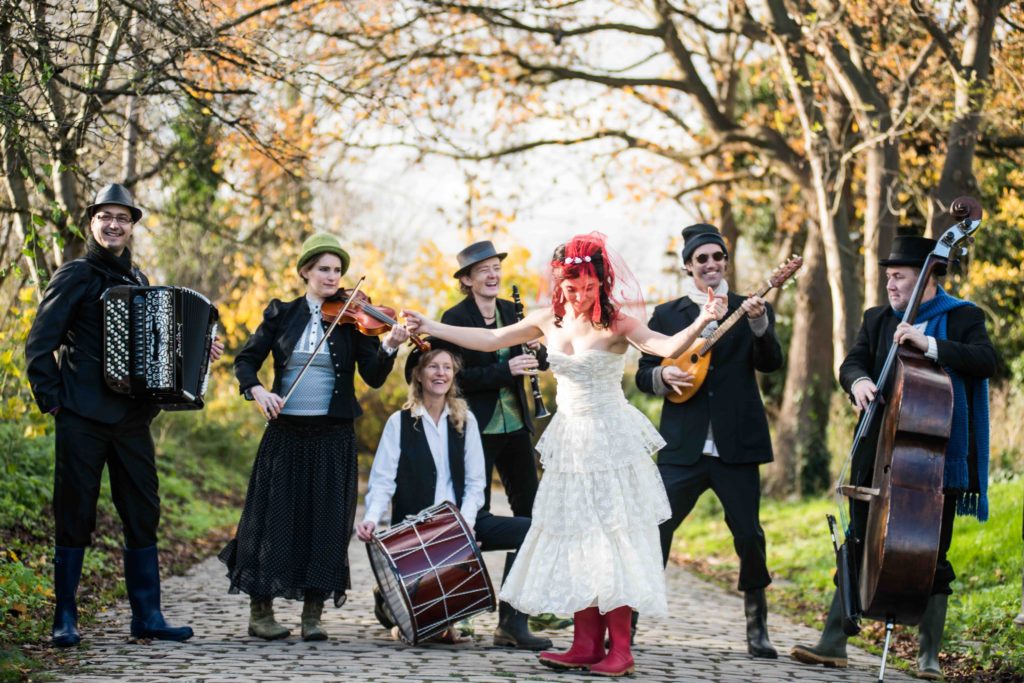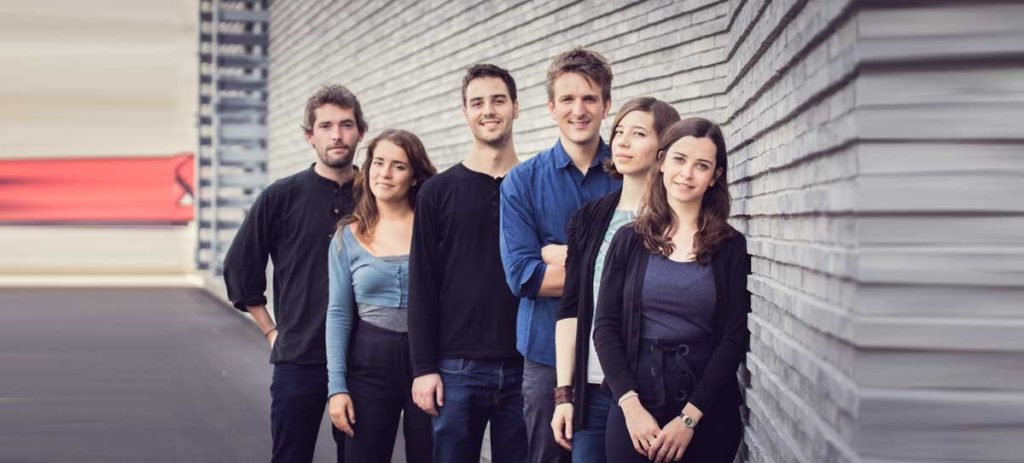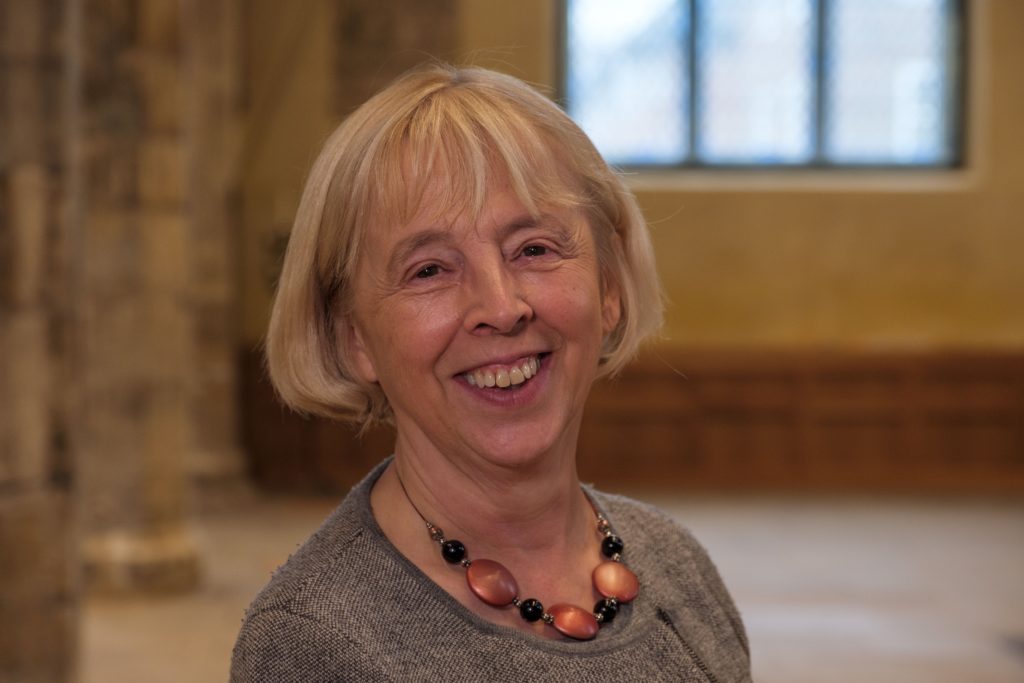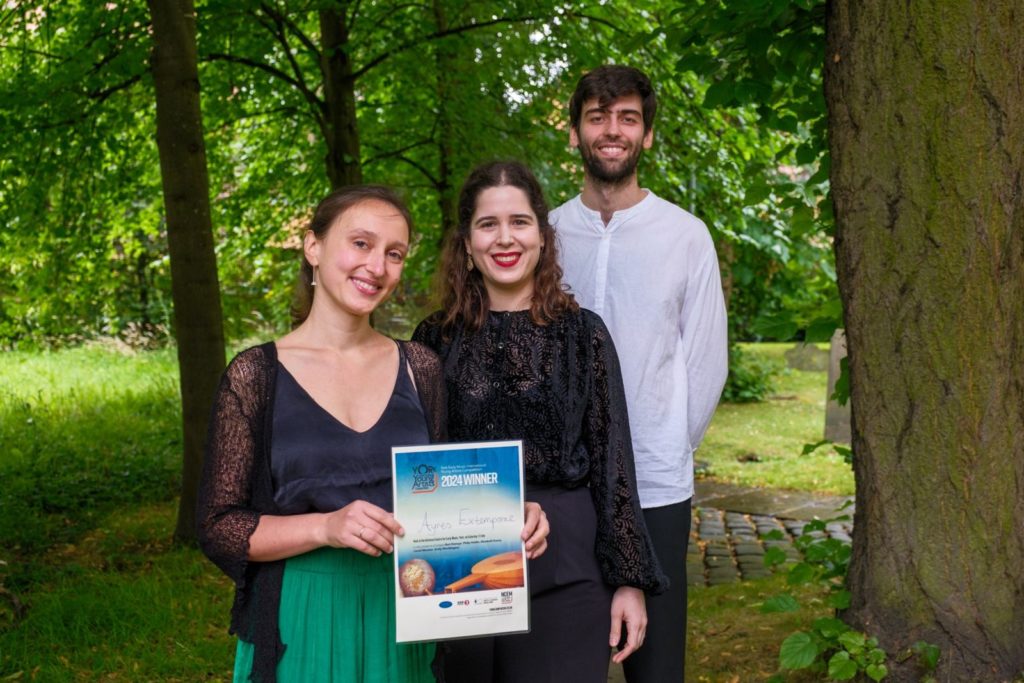
THIS seriously prestigious biennial competition at the National Centre for Early Music showcased an outstanding concert of “emerging talent in the world of music”. Although having just quoted from the informative programme, the eight ensembles seemed pretty much “emerged” to my ears.
The first to perform were Trio Altizans (The Netherlands): Eriko Nagayama, violin; Antonio Pellegrino, violoncello; Agata Sorotokin, fortepiano.
THEIR programme, entitled Geister Medley, opened with the Largo Assai Ed Espressivo from Beethoven’s Piano Trio no. 5 in D major, op. 70 no. 1. The Trio captured the spooky, impressionistic tone of the movement. The work is nicknamed ‘the Ghost Trio’ (a response by Carl Czerny to this eerie middle movement).
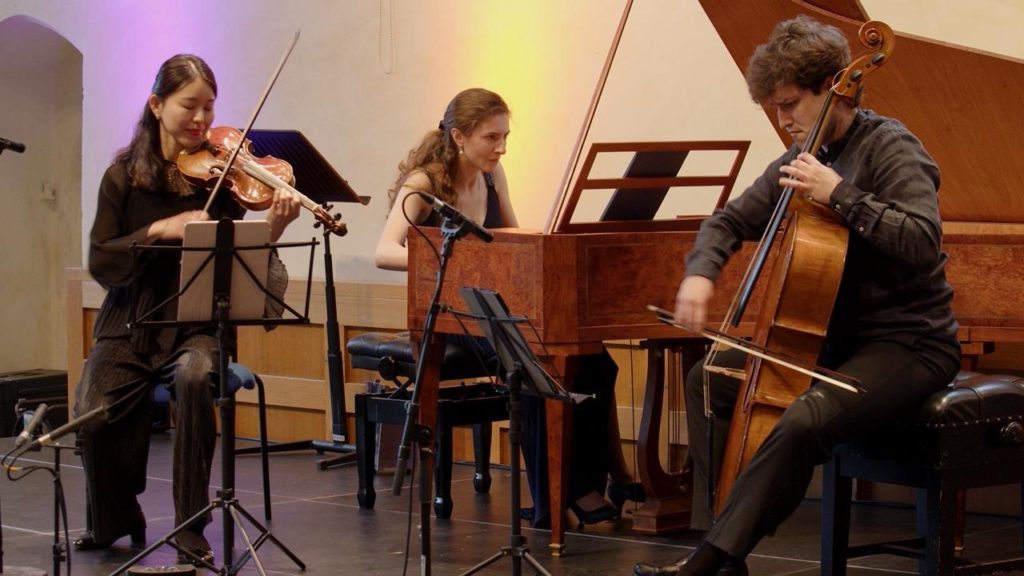
The performance reminded me how Gothic the music is – creepy bass tremolos in the piano etc. The fragmentary motifs, harmonies that had an instability – quite modern stuff really, but they made a convincing narrative throughout.
From Beethoven to Schubert and the last movement Allegro moderato from the great Piano Trio no. 2 in E flat major, D. 929. I thought the performance was focused, lively and the knitting together of different themes worked well, as did the closing triumphant ending. Not sure of the “early music” label here but I enjoyed it none the less.
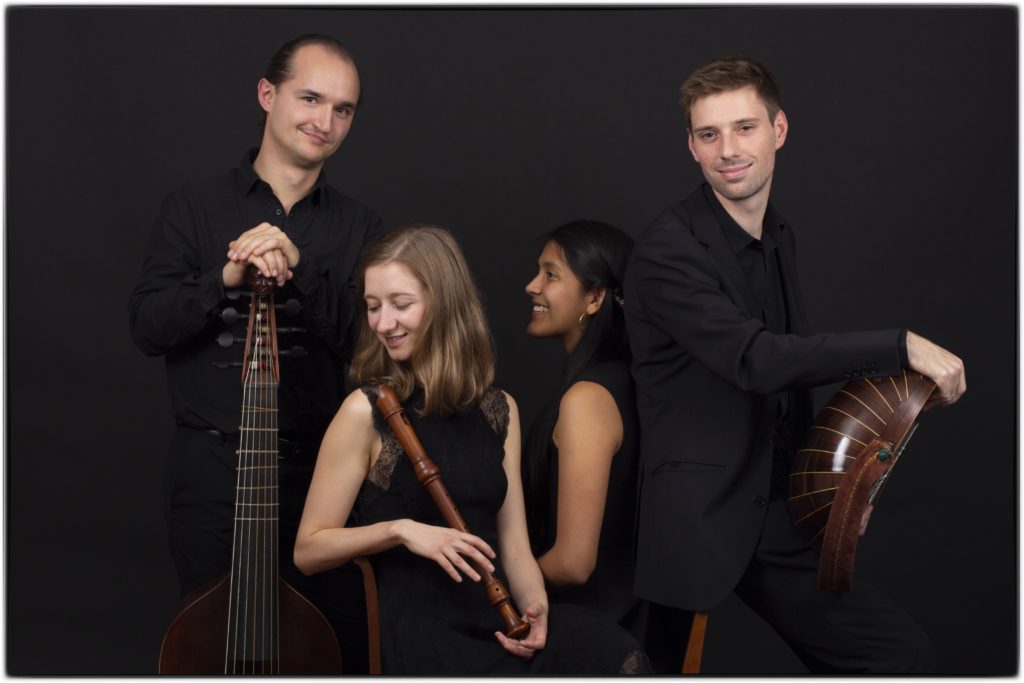
Ensemble Bastion (Switzerland): Maruša Brezavšček, recorder; Martin Jantzen, viola da gamba; Elias Conrad, theorbo; Mélanie Flores, harpsichord.
NOW this programme, entitled Les Goûts Réunis: The United Musical Tastes “takes its name from a collection of suites by François Couperin, reflecting the high-Baroque period’s rivalry between the musical centres of Italy and France” (programme note).
The programme opened with François Couperins Échos from his Concerts Royaux. I was impressed by the stylish ornamentation and the instinctive engagement between the players. The echoes, or echo effects, were charming.
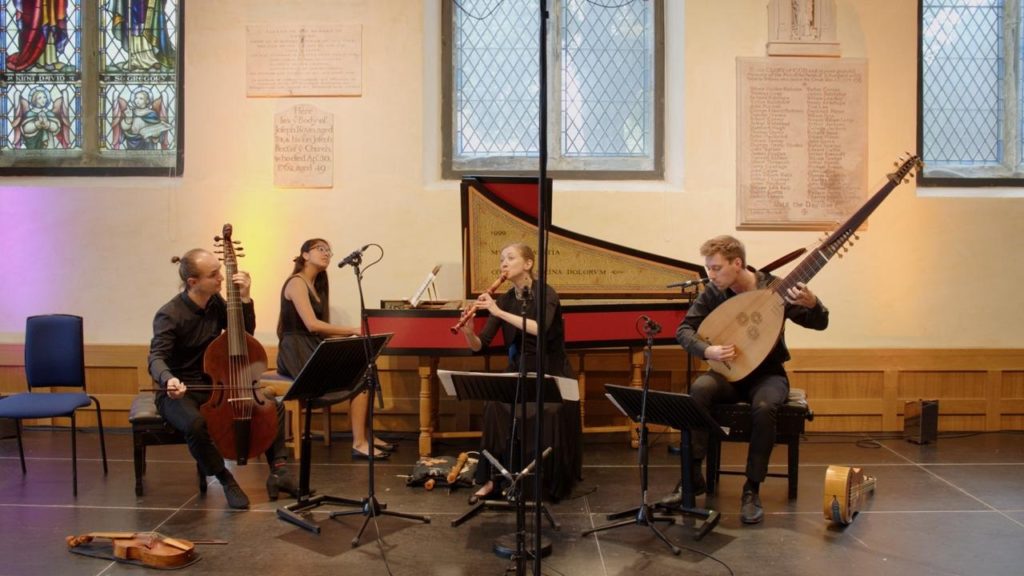
Arcangelo Corelli’s Sonata IV in F major, op. 5 was originally ornament-free until composer Johan Helmich Roman (among others) had his say. This was indeed ornament-rich and a joy to listen to.
They closed with Georg Philipp Telemann’s Sonata a Flute Dolce, Dessus de Viole e Basse. This was joy too, the slow movement so gently teased out. But it was the clear canonic dialogue throughout that stayed with me.
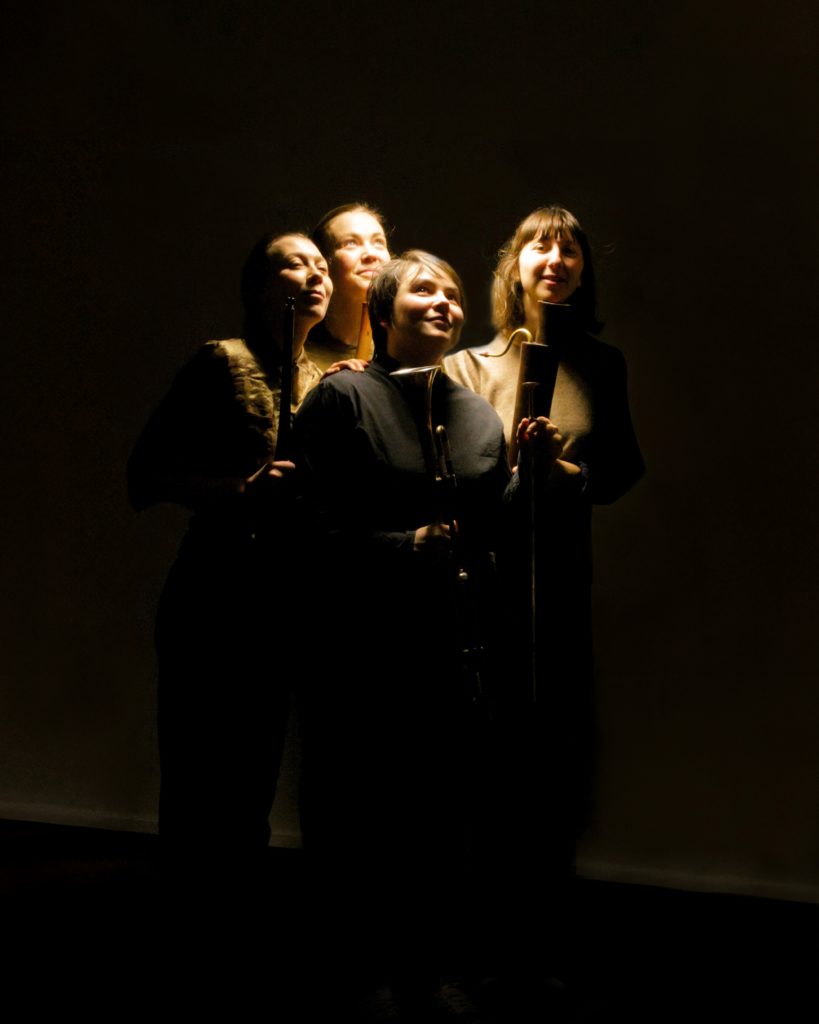
[hanse]Pfeyfferey (Germany): Laura Dümpelmann, shawms; Lilli Pätzold, cornetto; Alexandra Mikheeva, slide trumpet, trombone; Emily Saville, trombone.
WHO could object to an early music programme entitled: Party Like It’s 1524. Their programme note didn’t start promisingly: “In addition to our unwavering commitment to authentically merge musical practice with associated musicology and theory…”
But it perked up with “…we draw inspiration from the timeless human need to enjoy good company, food, drink and music”. Amen to that.
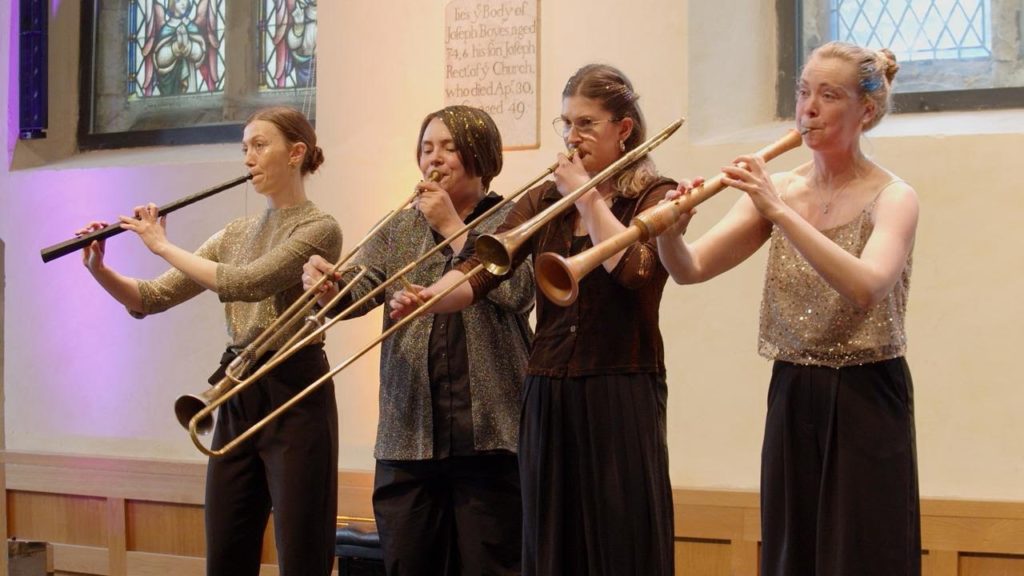
I had never heard of the composer Ludwig Senfl so I did a bit of Google listening. I thought the conservative sacred music was quietly impressive, but it was the secular, humanist songs that we were treated to here.
These were full of life and the performers radiated energy playing the music. So too the Improvisations. The performances so seductive, so infectious and, in the case of Isaac’s Lala Höhö and Zwischen Berg Und Tiefe Tal genuinely touching.
P.S. Ludwig Senfl studied with the great Heinrich Isaac and lost a toe in a hunting exercise. Now there’s one for the pub quiz.
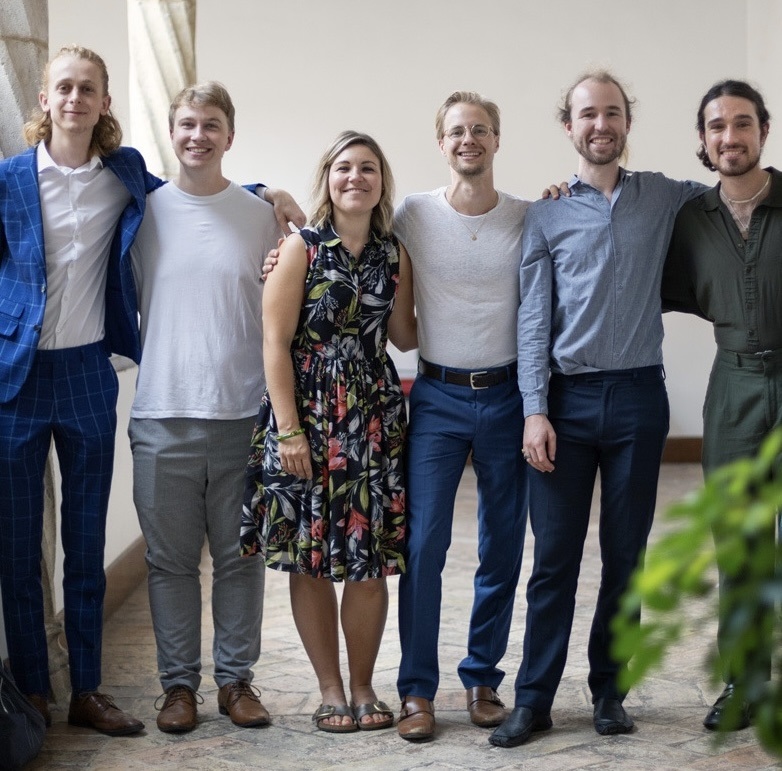
Apollo’s Cabinet (UK): Teresa Wrann, recorder; Thomas Pickering, harpsichord, traverso, recorder; David Lopez Ibanez, violin; Harry Buckoke, viola da gamba; Jonatan Bougt, theorbo, Baroque guitar; Daniel Watt, percussion.
THIS programme was entitled Musical Wanderlust: Charles Burney’s European Travels In Pursuit Of Harmony. Mercifully this concert was far more enjoyable than the turgid description would have had us believe. It was an attractive musical travelogue around pre-Brexit Europe through the eyes, ok the diaries, of Charles Burney.
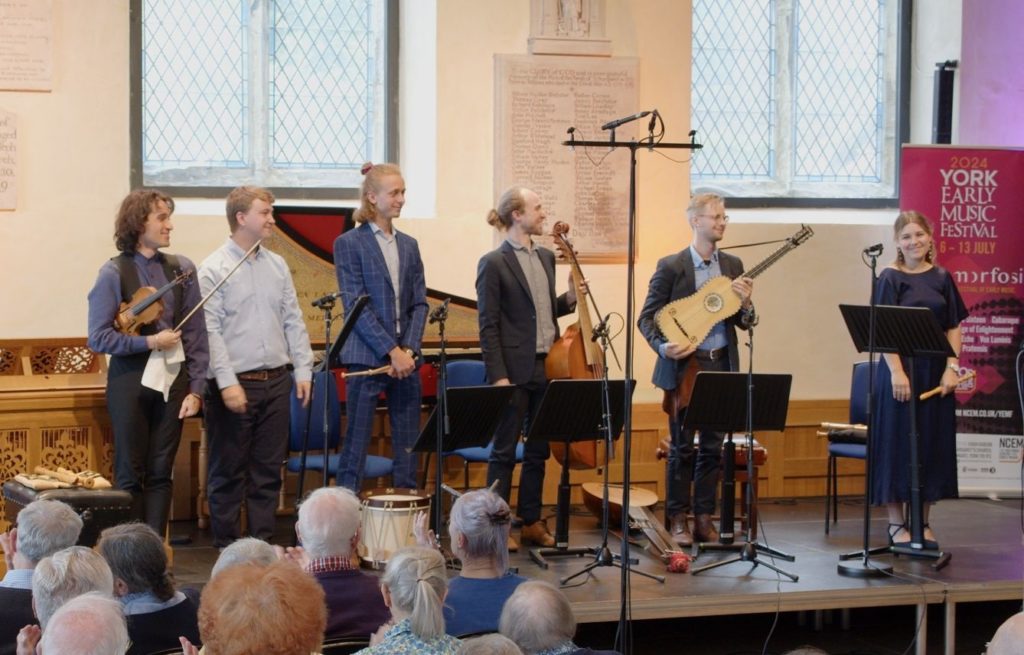
I absolutely loved the whole set. It reminded me a little of Red Priest, who might just have been an influence. This was revisiting Vivaldi, Buxtehude and the holiest of spiritual grails, Bach’s Goldberg Variations, from another perspective; a completely bonkers one.
Of the four prizes on offer this early music band must surely be a contender for one of them. “The most fun-filled, brilliantly whacky prize goes to…”
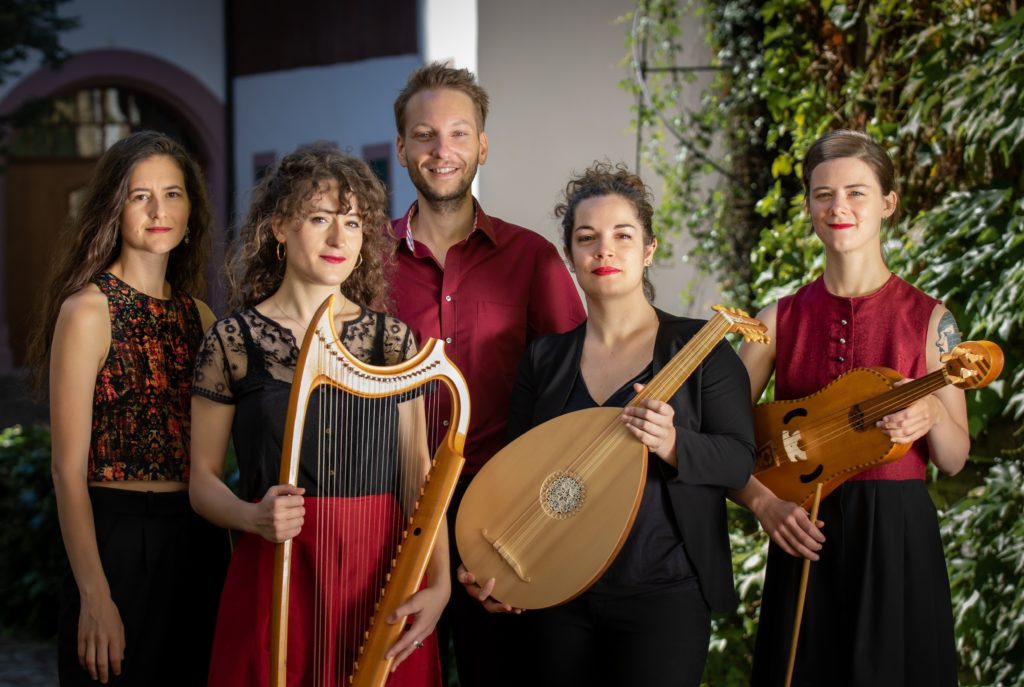
Rubens Roza (Switzerland): Aliénor Wolteche, medieval fiddles; Matthieu Romanens, tenor; Mélina Perlein-Féliers, medieval harps; Elizabeth Sommers, medieval fiddle, viola d’arco; Asako Ueda, medieval lute, Renaissance guitar.
A PROGRAMME entitled Warblings Of Paradise didn’t seem terribly inviting. Thankfully we had a note of explanation: “In Dante’s Paradise, music is the supreme joy of mankind. The pieces we are going to perform have both sacred and secular aspects and will give full rein to the sounds of heavenly instruments; harps, lutes, vielles and voice will alternate and blend to celebrate the harmony of souls.”
THE recital opened with Guiraut Riquier’s Aisi Com Es Sobronrada (from Chansonnier Provençal – La Vallière). This is intended to be a “declaration of love made to the Virgin”. And yet…tenor Matthieu Romanens was himself seductively serenaded by Aliénor Wolteche (medieval fiddle) and Mélina Perlein-Féliers (medieval harp) without, as far as I could see, much resistance. Mr Romanens has a lovely rich tenor voice with a particularly resonant lower register, which is rare.
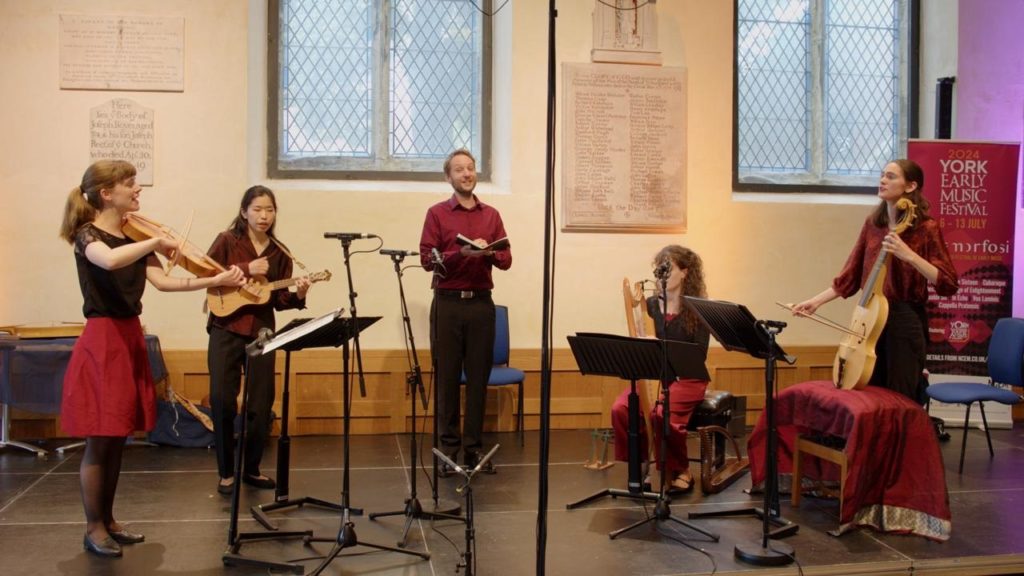
Following Rubens Rosa’s very engaging rustic dance, Estampie, we were back to Hail Mary, full of grace. There was a touching intimacy and a velvety richness in colour. Very enjoyable.
As indeed was Robert Morton’s instrumental N’aray Je Jamais Mieux Que J’ai, where the introduction of the viola d’arco (Elizabeth Summers) really enriched the tonal palette. Then back to Matthieu Romanens’ tenor voice in a dignified Fortuna Desperate (Anonymous). If you closed your eyes, his voice sounded more like a baritone than a tenor.
Their recital closed with a foot-tapping, rustic Laudato Sia Dio (Dindirindin). The call and response, the energy and rhythmic hemiola shifts (think Bernstein’s America) recharged the soul. Maybe.
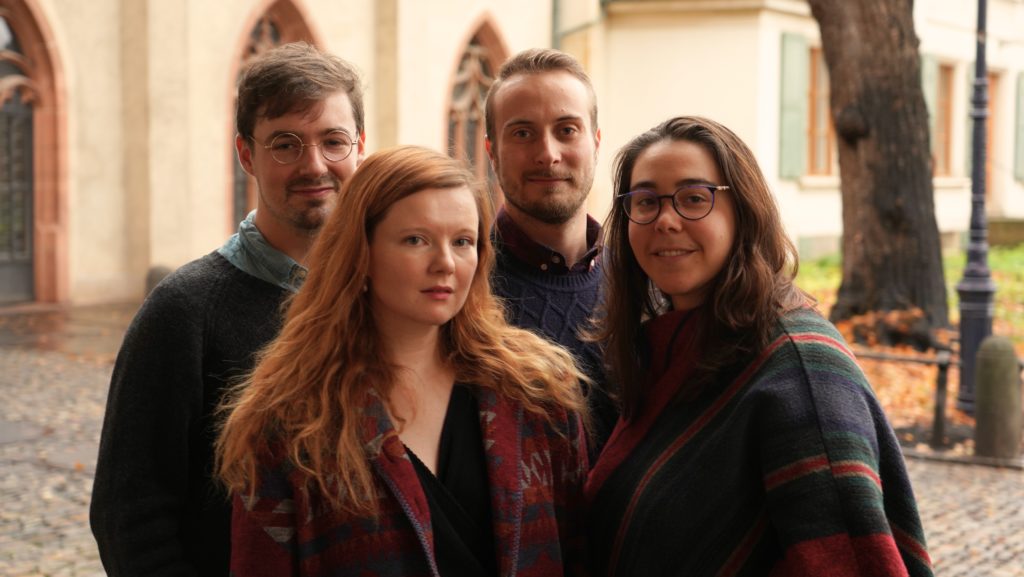
Pseudonym (Switzerland): Liane Sadler Baroque, traverso; Maya Webne-Behrman, violin; Stephen Moran, viola da gamba; Gabriel Smallwood, harpsichord.
PROGRAMME entitled Broken Colours. The notes describe this theme as: “To showcase the wide range of colours and sonic possibilities of this instrumentation, Broken Colours draws on various collections from different composers published throughout the first decades of the seventeenth century. Together they represent a cohesive survey of the prevailing instrumental genres and compositional hallmarks of the time…”
The recital opened with Dario Castello’s Nona Sonata à Tre (from Sonate Concertate In Stil Moderno, Libro Primo, 1621). To be honest I know very little about Dario Castello’s music but what I have heard I liked immensely. As the description “moderno” suggests, his music is progressive, exploring “new formal structures and means of expression” (programme note). I think this freshness did come across; the performance was tight, stylish and full of energy.
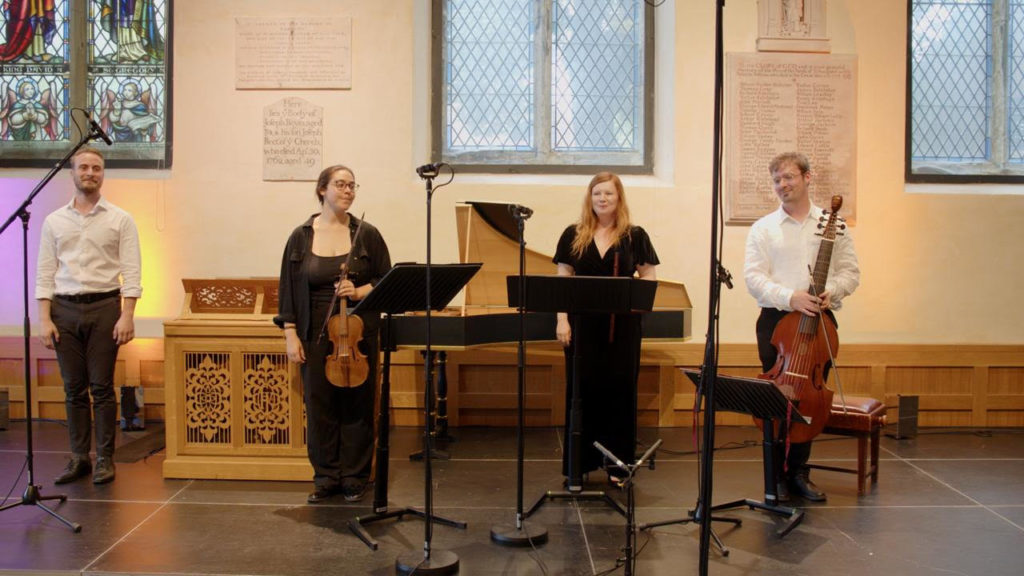
Other Baroque pioneer composers also featured in the recital. I thought the ensemble’s performance of Tarquinio Merula’s Ballo Detto Eccardo was extremely expressive and gave Liane Sadler (traverse flute) an opportunity to shine. Which she did. Biagio Marini’s La Foscarina, Sonata a 3, Con Il Tremolo was pretty amazing too. The players really caught the inventive, expressive nature of Marini’s writing, this time giving violinist Maya Webne-Behrman an opportunity to shine, and she duly did.
The recital closed with Andrea Falconieri’s rhythmically driven Ciaconna And Pseudonym clearly enjoyed playing it as much as we did listening to it. An infectious, foot-tapping pleasure. What a way to sign off.
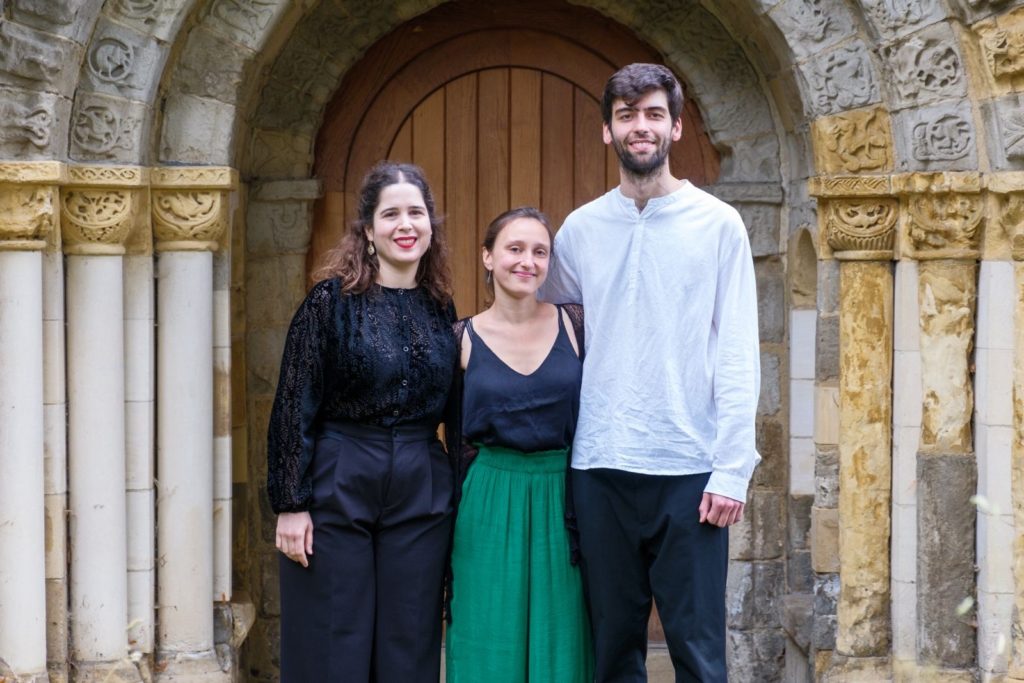
Ayres Extemporae (Belgium): Xenia Gogu Mensenin, violin; Víctor García García, violoncello piccolo; Teresa Madeira, violoncello.
UP to this point, I had forgotten that this was a competition. That was until Ayres Extemporae walked on to the stage and opened their recital with an X-rated, blistering account of Heinrich Ignaz Biber’s Sonata for violin and continuo in E minor, C.142.
Xenia Gogu Mensenin’s violin playing – technically brilliant, musically utterly hypnotic and completely fearless – immediately demanded attention. To be sure, there was some respite to be had in the beautiful Aria but this couldn’t last and didn’t; Ms Mensenin got her second wind, the violin bursting free of the constraints of the song, then regained the narrative of “torment” and headed for the finish line with indecent haste.
This was beyond ‘redemption’, nevertheless this remarkable Trio gave it their best shot with Johann Sebastian Bach’s Erbarme Dich from Ich Armer Mensch ich Sündenknecht, BWV 55 (arr. for violoncello piccolo, violin and continuo).
This wonderful aria is (obviously) from the St Matthew Passion. Erbarme Dich (Have Mercy) represents Peter’s weeping and distress at having denied knowing Jesus three times. Here the violoncello piccolo ‘sings’ the tenor aria.
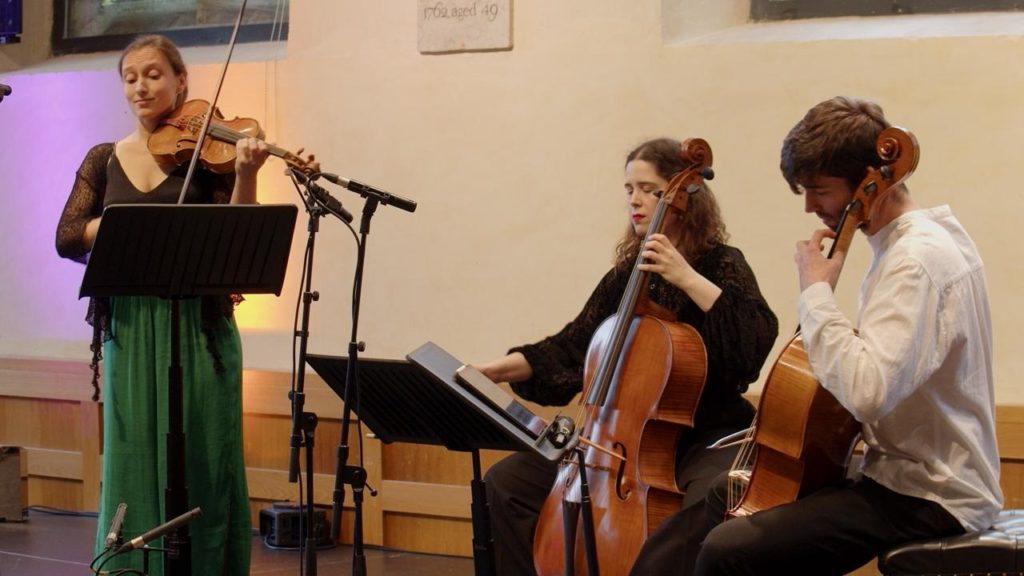
The performance by Víctor García García was very persuasive: meditative, expressive and genuinely moving. Whether it was persuasive enough, however, was to be found along the “path to forgiveness”. Once again, the Trio turned to Bach, this time the Sonata for Viola da Gamba and Harpsichord in G major, BWV1027 (arr. for violoncello piccolo, violin and continuo).
In this version, “the cello piccolo takes the role of the viola da gamba, and the violin and the cello play respectively the right and left hand of the harpsichord part” (programme note).
The E minor Andante had a haunting quality. The violoncello (Teresa Madeira) gracefully weaving through the arpeggiated progressions. The performance was so moving and soul searching. The final Allegro moderato was a dance, a bourrée and fugal.
Thus, giving all three of these outstanding performers the chance to show how well they intuitively understood and communicated this music. A real joy and, to quote Tina Turner, Simply The Best?
Before I typed this review, I thought I knew who the winner might be. I just wished I had behaved like a true, blue-rinsed politician and popped out to place a bet before the coronation.
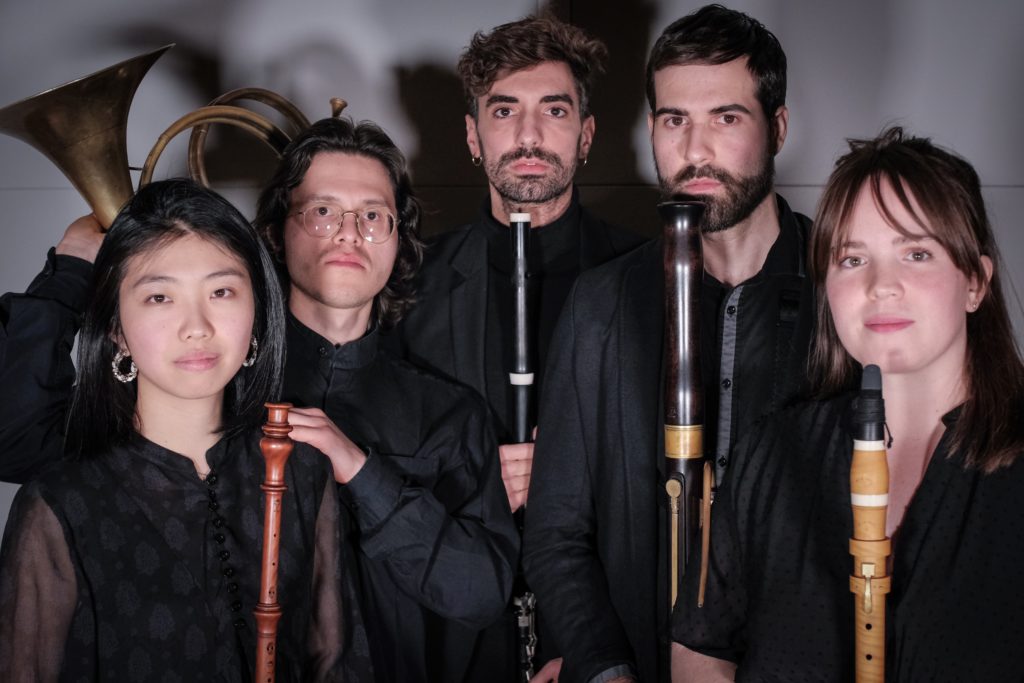
Friedrichs Nebelmeer Ensemble (Switzerland): Pablo Gigosos, flute; Mei Kamikawa, oboe; Claudia Reyes, clarinet; Andrés Sanchez, horn; Angel Alvarez, bassoon.
HAVING lived and breathed contemporary music for most of my adult life, I am not a great fan of the 20th-century Wind Quintet repertoire (Birtwistle and the tedious Schoenberg works spring to mind, and back out again). But this Baroque repertoire of Franz Danzi, Giuseppe Cambini and Anton Reicha played by the charmingly enthusiastic Friedrichs Nebelmeer Ensemble was just delightful.
We were told to “expect some fun after a seven-hour concert’”, and we did. The problem is, however, that zippy exchanges – the musical flair in, for example, the Finale: Allegretto of Reicha’s Wind Quintet in E flat major, op. 88 no. 2 – can mask the technical brilliance.
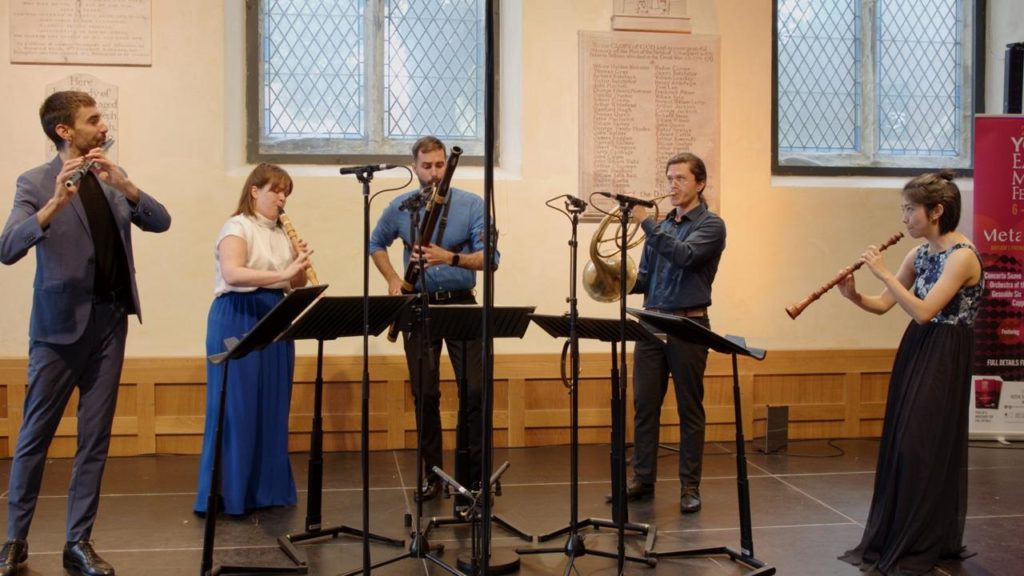
This closing movement is an energetic rondo and all of the performers embraced the solos on offer. I loved the intimacy of the sound the Ensemble generated.
The Larghetto Sostenuto Ma Con Moto from Giuseppe Cambini’s Wind Quintet no. 2 in D minor was so sweetly sung; it’s not often you hear a wind quintet blending as beautifully as this. Again, so intimate but this time with a velvety sensuous colouring.
Their recital actually opened with Franz Danzi’s Allegrettos no’s I and IV from his Wind Quintet in G minor, op. 56 no. 2, a work dedicated to Anton Reicha. Crisp staccato playing, perfect handovers of the musical motifs, lovely clear balance; and yes, it radiated enjoyment.
I do have critical observations and suggestions – not all the performances were uniform, at times not all the balance was quite as democratic as it might have been, and there were a few slips.
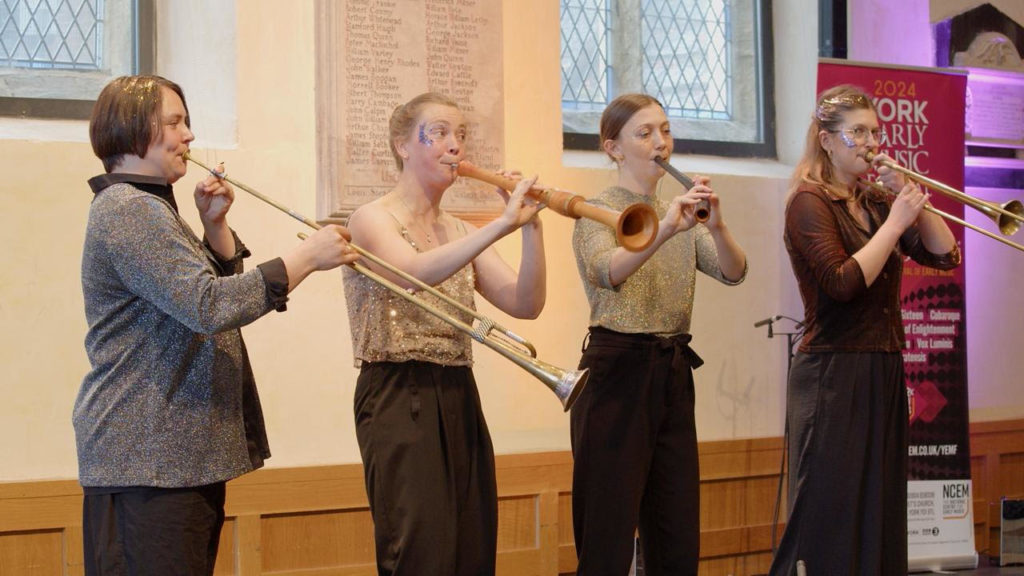
But given the quality of these Young Artists and the fact that they had two days of “informal recitals” with completely different programmes and in the company of Steven Devine, then discretion and humility are surely the order of the day.
But I will say that the programme notes, although informative and indeed often insightful, veered towards the academic, seldom a good thing, and a bit dull.
Not surprisingly the “tell us a bit about yourselves and your programme” bit was a distraction at best. To this end, I would suggest drawing from the “everyday” anecdote of Steven Devine himself.
Here Mr Devine took us through a typical York ginnel to the Three Legged Mare pub. There was a folk-blues band playing and he popped in for a pint. Through the window, he noticed some members of an ensemble looking in. He bought them a drink and left. When he returned one of the players had joined in.
One can take many things from this lovely account: that this could never, ever happen at a “classical” music concert; that this musical experience belongs to the working class, pop, rock, folk, blues culture, or that the beer in the Three Legged Mare is decidedly better than that on offer at the NCEM.
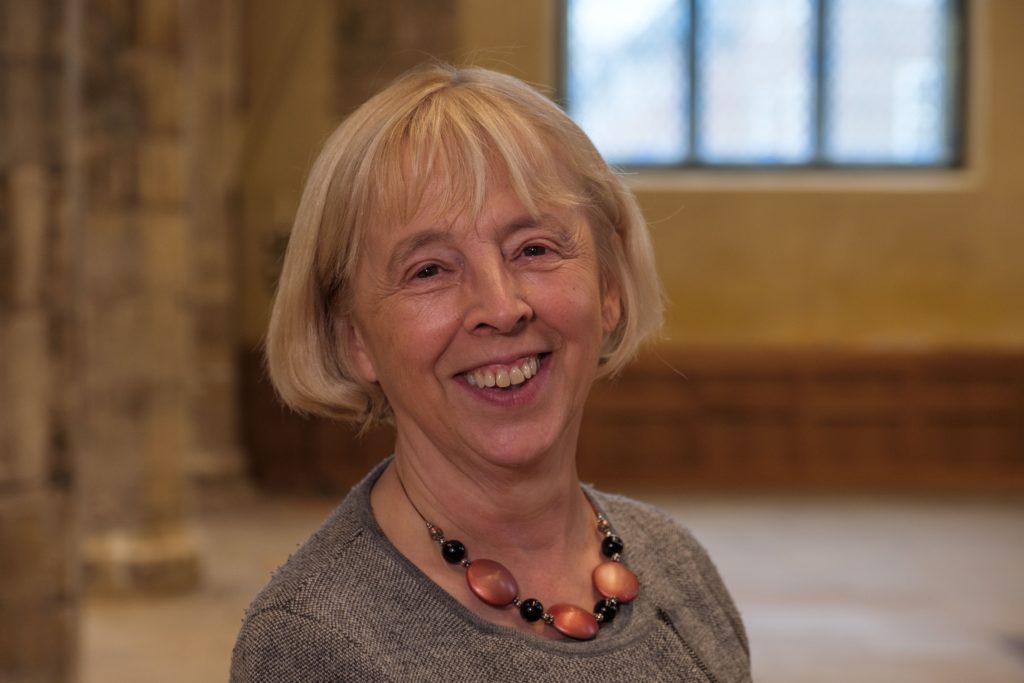
For me, it is about the love and importance of music and music making. And what an enriching experience this is. Bob Dylan and John Adams are both great composers, just different.
Anyway, back to the competition. A panel of experts in the field of Early Music, Bart Demuyt, Philip Hobbs, Elizabeth Kenny, Lionel Meunier and Emily Worthington judged that Ayres Extemporae were the winners of this prestigious York Early Music International Young Artists Competition.
Additional prizes went to: [Hanse]Pfeyfferey (Cambridge Early Music), Ensemble Bastion (EUBO Development Trust) and Apollo’s Cabinet (Friends of York Early Music Festival).
So, what a way to close this remarkable festival: with renewal. Talking of which, none of this could happen without the dedication, professionalism and creativity of Delma Tomlin MBE, director of the internationally acclaimed National Centre of Early Music (NCEM) and the York Early Music Festival.
Unfortunately, I am all out of superlatives, so how about “National Treasure”? Sorry Delma.
Belgian trio Ayres Extemporae win the 2024 York Early Music International Young Artists Competition
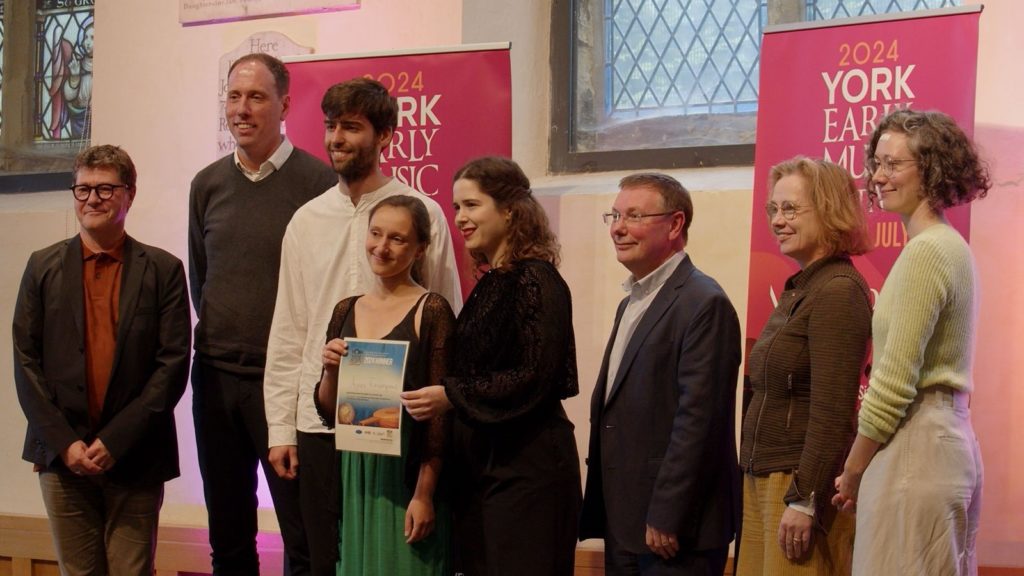
AYRES Extemporae were awarded first prize at the York Early Music International Young Artists Competition last Saturday, against fierce competition from seven fellow international ensembles from across Europe.
The Belgian-based ensemble receives a professional recording contract from Linn Records, a £1,000 cash prize, a future paid engagement with the York Early Music Festival and recording opportunities with BBC Radio 3.
During the two days before the competition, each ensemble presented an informal recital at the National Centre for Early Music, Walmgate, with the aim of giving the musicians the opportunity to adapt to the performance space and become accustomed with festival audience members in advance of the final.
These groups were selected from a pool of 48 ensembles from across the world and were judged by an international jury of Bart Demuyt, director of AMUZ/Alamire; Philip Hobbs, from Linn Records; Elizabeth Kenny, internationally acclaimed lutenist; Lionel Meunier, director of Vox Luminis, and Emily Worthington, clarinettist and University of York lecturer.
The competition provided a spectacular finale to the ten-day festival, which connected old friends and new through concerts, recitals and workshops staged in a variety of historic venues around the city.
The recitals from this year’s final are available to watch on demand at ncem.co.uk and on the NCEM’s YouTube channel and edited highlights will be shared on BBC Radio 3’s Early Music Show on Sunday, November 3 2024.
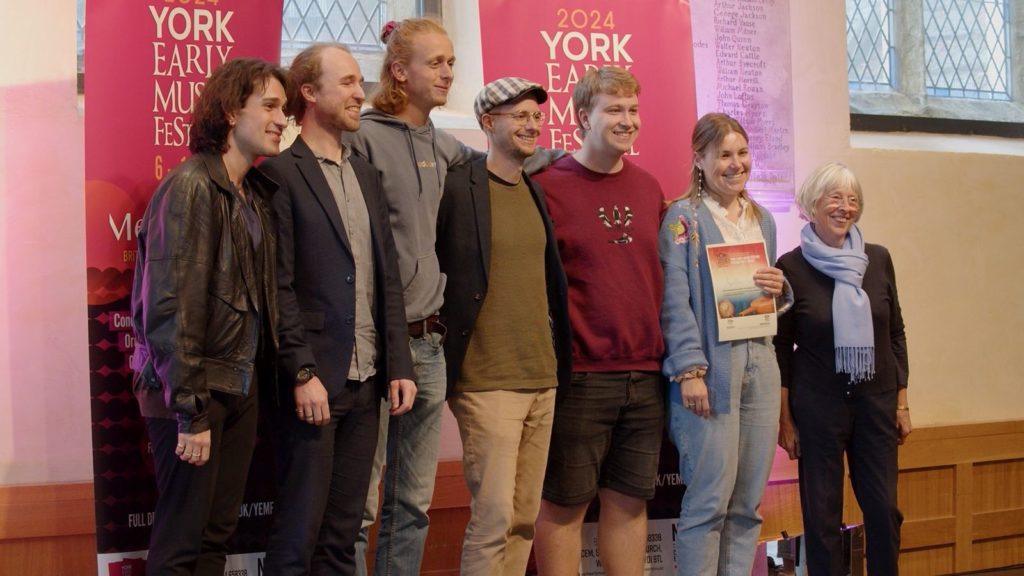
Ayres Extemporae are: Moldovan-Spanish violinist Xenia Gogu, Spanish cellist Víctor García García, playing on a five-string cello piccolo, and Portuguese cellist Teresa Madeira.
Apollo’s Cabinet, from the UK, scooped the Friends of York Early Music Festival Award, a cash prize of £1,000; Ensemble Bastion won a cash prize of £1,000, endowed by the EUBO Development Trust, for the Most Promising Young Artists specialising in the Baroque repertoire, and [hanse] Pfeyfferey scooped the Cambridge Early Music Prize, which includes a paid performance in Cambridge.
The 2024 finalists were: Apollo’s Cabinet (UK); Ayres Extemporae (Belgium); Ensemble Bastion (Switzerland); Friedrichs Nebelmeer Ensemble (Switzerland); [hanse] Pfeyfferey (Germany); Pseudonym (Switzerland); Rubens Rosa (Switzerland) and Trio Altizans (Netherlands).
The 2024 competition was presented by Steven Devine,harpsichordist, fortepianist, conductor and director of orchestral, choral and opera repertoire, and former artistic advisor to the York Early Music Festival.
At the end of the competition, Philip Hobbs, from Linn Records, who chaired the judging panel, said: “This competition is definitely one of the musical highlights of the year and Linn Records is very proud to continue this important relationship with the York Early Music Festival and with the National Centre for Early Music.
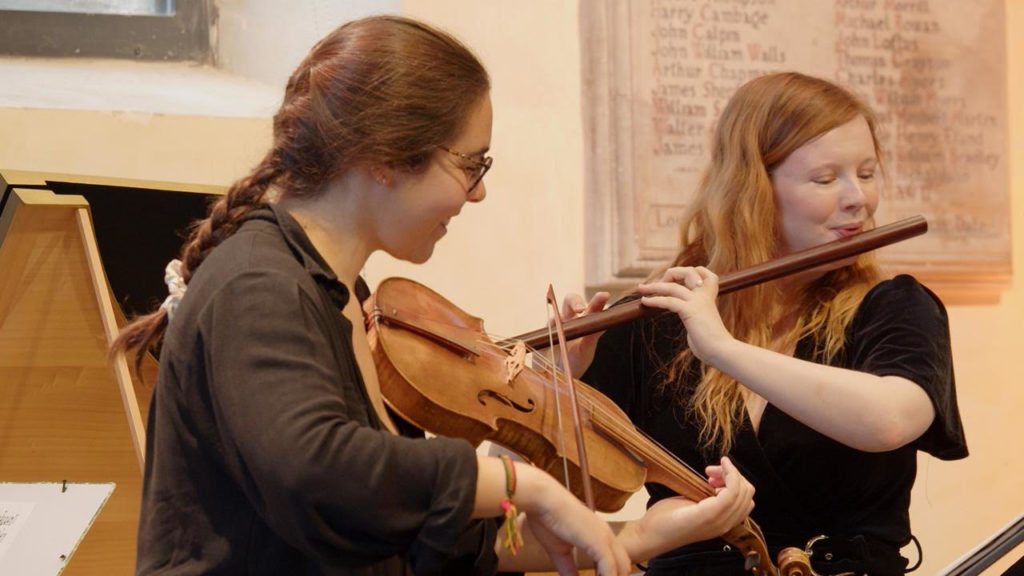
“Today’s concert illustrated an array of extraordinarily inventive musical talent, and I would like to congratulate all eight ensembles who performed.”
Delma Tomlin, NCEM director and festival administrative director, said: “It was wonderful to welcome these eight ensembles from the UK and Europe to what is always an enriching experience and an amazing opportunity to share music and enhance their skills.
“I would like to thank everyone who appeared today, once again the standard of performance was of the highest calibre. I would also like to say a huge thank-you to our panel of judges for their hard work and support and also to Steven Devine for his expertise and invaluable help.”
Winners Ayres Extemporae said: “We’re absolutely delighted and honoured to receive this amazing prize and would like to thank everyone who has supported us – our time in York has been a wonderful experience and everyone has been super-friendly.
“We’d like to thank all the other ensembles for their encouragement, friendship and brilliant musicianship, it’s been a real pleasure spending time with the other musicians. We’re really looking forward to returning to York and recording with Linn Records.”
York Early Music Festival celebrates at York Mansion House
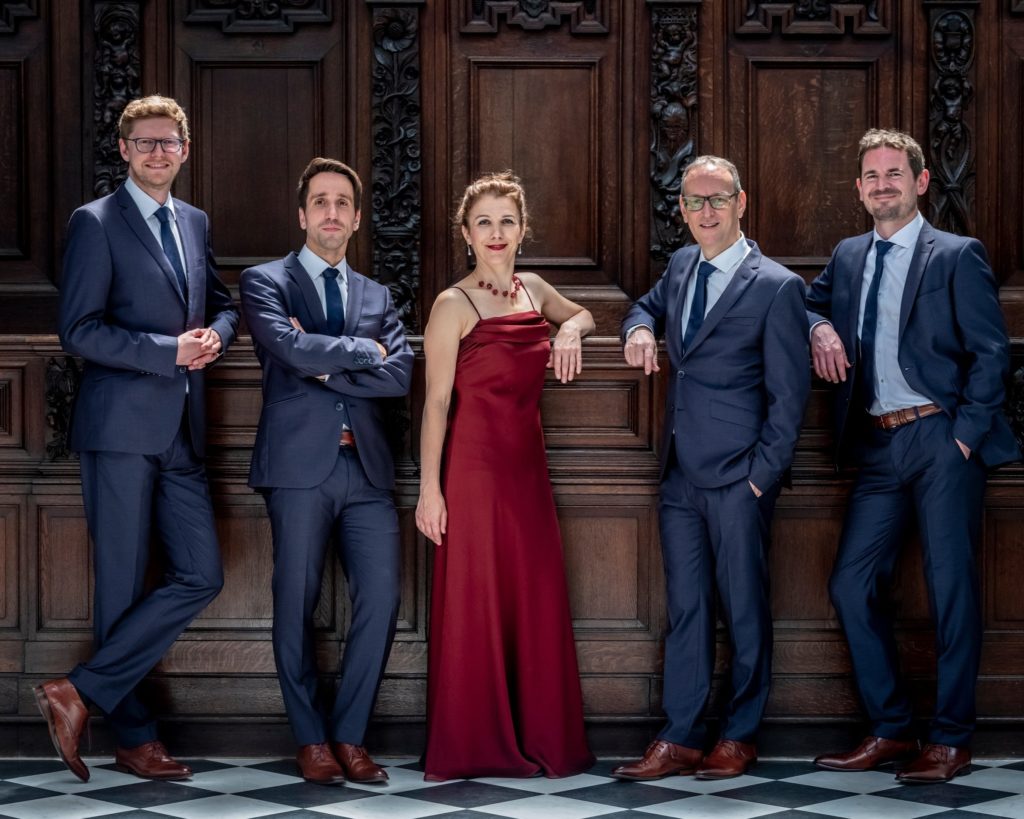
THE 2024 York Early Music Festival enjoyed not one, but two celebrations in the presence of the Lord Mayor of York, Councillor Margaret Wells, last week.
Young musicians from the United Kingdom, Switzerland, Germany, Belgium and even Mexico arrived in York to take part in the York Early Music International Young Artists Competition, held in the city every two years.
The musicians were welcomed with a drinks reception and enjoyed a tour of York Mansion House with the Lord Mayor, who revealed some of the resplendent Georgian building’s hidden secrets.
The next day, the Delegation of Flanders to the UK hosted a reception to mark Flanders Day – a major national holiday in the Belgian region – in celebration of a new partnership with the York Early Music Festival, in association with the Alamire Foundation and AMUZ, with support from the Flanders government.
Bart Brosius, General Representative of Flanders in the UK and Ireland, welcomed the delegation to York and Bart Demuyt, from the Alamire Foundation in Flanders, extended a warm thank-you to the National Centre for Early Music director Delma Tomlin for her continued hard work, giving aspiring young musicians from the UK and beyond the encouragement and recognition they deserve.
Guests included: York Central MP Rachael Maskell; Claire Douglas, Leader of City of York Council; Joan Concannon, University of York; Philip Nelson, Harrowells Solicitors; Adam Butterworth, Department for Business and Trade, and many other guests from the Flanders delegation.
Audiences enjoyed concerts by two ensembles from Flanders, Utopia at the National Centre for Early Music and Cappella Pratensis & I Fedeli at York Minster.
